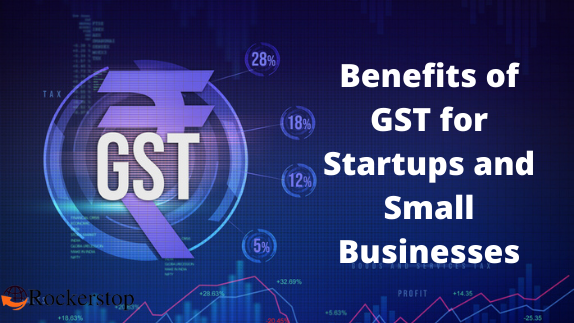Benefits of GST for Startups and Small Businesses
The implementation of the Goods and Services Tax (GST) in India has enormously influenced the way startups function. GST has terminated some indirect taxes and combined everything under its own larger umbrella. It was introduced with a slogan of “One Nation One Tax” to ease compliance plans for businesses and specially for startups.
With the implementation of GST in India, the procedure for GST registration became centralised and also standardised. It shall remain almost like the service tax registration. Under the GST regime, the business would not need to obtain multiple VAT registration. As a single GST registration applies across India. Therefore, the procedure for getting GST registration would also become standardised. Thereby improving the convenience of starting a replacement business in India with none difficulties.
GST for startups: All you would like to understand before you register
The entire GST registration process takes place online, saving you the effort of running from one office to a different one.
Here’s a checklist of all documents required for GST registration for startups:
- Company Pan card
- The Ministry of Corporate Affairs incorporation certificate
- Memorandum/Articles of association
- Signatory’s appointment proof
- Signatory’s PAN card
- A Signatory’s Aadhaar card
- PAN card & address proofs of enlist directors
- Address proof for place of business (copies of lease agreement/ latest electricity bill/property tax receipt)
- Proof of checking account (scanned copy of the primary page of bank passbook/bank statement/cancelled cheque
While the products and Services Tax (GST) is predicted to facilitate that growth, not all aspects of the new tax regime are startups-friendly. Let’s take a glance at how GST has impacted startups
1. Higher threshold for GST registration
Before the implementation of GST, any business with a turnover of quite Rs 5 lakh during a fiscal year was required to get VAT registration. However, any business whose turnover exceeds Rs 40 lakh during a financial year is required to register under GST. This limit is Rs 20 lakh for service providers like freelancers.
This higher threshold under GST has brought compliance relaxation to many startups in India, including small business.
2. Enjoy tax credit
A lot of startups in India are a neighbourhood of the industry. Prior to GST, they had to gather and pay service tax to the govt. Non-utilisation of the VAT paid on purchases made for business basis was one among the first concerns. There was no provision for claiming the credit of state VAT paid against the service accountability.
Since GST has brought several indirect taxes under its umbrella, the matter has been resolved now. Startups can withdraw tax paid on the purchases (for example office supplies) with the tax paid on their sales under GST.
3. Ease of running business
GST, there will be one single registration and less paper work. The business owners would now be ready to focus their energy in completing productive business operations instead of complying with complicated tax laws.
4. Expansion of business
Most small businesses restrict their business operations to at least one state thanks to inter-state taxes and sophisticated tax procedures. This limits their customer stand to the state where they’re located. GST will simplify the inter-state tax complications, reducing the value of supplying goods across states. This will inspire business owners to expand business Pan India; thus, increasing their customer base.
5. Reduced tax burden
Under the present scenario, businesses with turnover of but Rs. 5 lakhs don’t need to pay the VAT registration fee. This limit has been increased to Rs. 20 lakhs under the proposed GST bill. This will reduce the tax burden on the SMEs.
6. Cascading of taxes has been eliminated
Since GST was implement to bring all the indirect taxes under one umbrella, the sooner hassle of tax cascading (or tax on tax) has been eliminated. This translates to more direct savings for little businesses.
7. Online compliance processes
It has become extremely easy for little business owners to file their returns with the introduction of a web portal. A centralised digital system means they do not have to register separately with different tax entities and undergo the effort of navigating through manual workflows.
8. Easier Invoicing
Invoicing becomes easier because the tax apply uniformly and there’ll be no distinction between goods and services thereby reducing evasion and cash in of varied tax incentives.
9. Reduction in Transportation and Logistics Cost
Before the new GST regime, the state governments have applied their own different tax structure when it came to Octroi and CST applicability for interstate transportation of products. Therefore, the implementation of GST is often considered as a conquest by the central government in India and a welcome move for startups.
Conclusion
GST may be a pivotal reform, not just for startups, but major corporations also. The implementation of GST ensures that startups have a neater experience with tax compliance than under the previous regime, which they enjoy additional benefits, like smoother movement of products. Both of those benefits release tight budgets for operations and performance of services.
To get more information about GST for Freelancers visit GST for Freelancers and Bloggers
